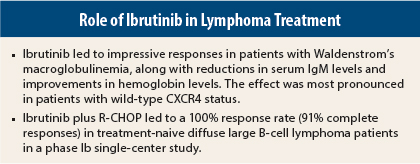The Bruton’s tyrosine kinase inhibitor ibrutinib (Imbruvica) is changing the landscape of treatment in chronic lymphocytic leukemia. New research with the drug in lymphoma, presented at the 2013 American Society of Hematology (ASH) Annual Meeting in New Orleans, indicates it may be of benefit in this malignancy, as well.
Findings in Waldenstrom’s Macroglobulinemia
In a multicenter phase II study of 63 patients with relapsed or refractory Waldenstrom’s macroglobulinemia, treatment with ibrutinib led to rapid reductions in serum immunoglobulin M (IgM) levels and improvements in hematocrit levels.
“Responses were durable, with 87% of patients continuing on treatment at a median of nine cycles,” said Steven Treon, MD, PhD, Director of the Bing Center for Waldenstrom’s Research and attending physician at Dana-Farber Cancer Institute and Brigham and Women’s Hospital,
Boston.1
Patients received ibrutinib at 420 mg/d for up to 2 years. At baseline, mean serum IgM level was 3,610 mg/ dL and mean hemoglobin level was 10.5 mg/dL.
The overall response rate was 83%, with major responses observed in 64% of patients. Following treatment, serum IgM fell to 1,260 mg/dL (P = 1.46088−17) and hemoglobin improved to 13.4 mg/dL (P = 9.0366−19). “You see profound drops in IgM,” he noted.
Among 31 patients with extramedullary disease for whom scans were available, 67.7% had an improvement in adenopathy and 20% had an improvement in splenomegaly; 25.8% and 80%, respectively, were stabilized.
“By far, this was a very well-tolerated therapy,” Dr. Treon said. The most common grade 2 or higher adverse events were thrombocytopenia (n = 10) and neutropenia (n = 12), mostly occurring in heavily pretreated patients. Most bleeding events were seen in patients taking fish oil supplements.
Genetic Driver Identified
Dr. Treon and his colleagues initiated the study after laboratory research revealed the high prevalence of the MYD88 L265P gene in Waldenstrom’s macroglobulinemia, triggering activation of Bruton’s tyrosine kinase in Waldenstrom’s macroglobulinemia cells. “Later, through deactivation of [Bruton’s tyrosine kinase], ibrutinib was found to abolish binding of MYD88 to [Bruton’s tyrosine kinase] in L256P-expressing [Waldenstrom’s macroglobulinemia] cells,” he said. Ibrutinib can selectively kill tumor cells of L265P-mutant cell lines, relative to wild-type controls.
They also looked at mutations in a chemokine receptor called CXCR4, which are present in about 30% of Waldenstrom’s macroglobulinemia patients. These mutations reduce the ability of ibrutinib to kill Waldenstrom’s macroglobulinemia cells, but based on in vitro lab work, this obstacle may be reversible by inhibitors of CXCR4, he noted.
Patients with WHIM syndrome, (a rare immunodeficiency disorder with symptoms manifesting as Warts, Hypogammaglobulinemia, Infections, and Myelokathexix), and the CXCR4 mutation were significantly less likely to respond to ibrutinib (30%) than were patients with wild-type CXCR4 (80%, P = .0065), whereas the MYD88 L265P mutation had no significant impact on response.
“The IgM reductions are far more impressive in individuals who have wild-type CXCR4 status. The degree of gain in hemoglobin is also more impressive in individuals with wild-type CXCR4,” Dr. Treon noted. Better responses to ibrutinib were associated with lymphocytosis.
Active in Diffuse Large B-Cell Lymphoma
In a phase Ib study in 22 treatment-naive diffuse large B-cell lymphoma patients, 100% of subjects responded to the combination of ibrutinib at 560 mg/d plus standard R-CHOP (rituximab [Rituxan],
cyclophosphamide, doxorubicin, vincristine, and prednisone), given for six cycles. Complete responses were observed in 91% and partial responses in 9%, according to Anas Younes, MD, Chief of the Lymphoma Service at Memorial Sloan-Kettering Cancer Center, New York.2
Serious adverse events were reported in 12 patients, most commonly febrile neutropenia (17%).
A phase III trial of R-CHOP plus ibrutinib is ongoing in a select group of patients with de novo, treatment-naive non–germinal-center B-cell–like diffuse large B-cell lymphoma.
Disclosure: Dr. Treon has served as a consultant for and received honoraria and research funding from Pharmacyclics and Janssen. Dr. Younes has received honoraria from Pharmacyclics, Janssen, Seattle Genetics, Millennium, and Incyte.
References
1. Treon SP, Tripsas CK, Yang G, et al: A prospective multicenter study of the Bruton’s tyrosine kinase inhibitor ibrutinib in patients with relapsed or refractory Waldenstrom’s macroglobulinemia. 2013 ASH Annual Meeting. Abstract 251. Presented December 9, 2013.
2. Younes A, Flinn I, Berdeja J, et al: Combining ibrutinib with rituximab, cyclophosphamide, doxorubicin, vincristine, and prednisone (R-CHOP): Updated results from a phase 1b study in treatment-naïve patients with CD20-positive B-cell non-Hodgkin’s lymphoma. 2013 ASH Annual Meeting. Abstract 852. Presented December 10, 2013.


